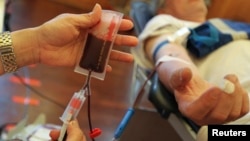GENEVA, SWITZERLAND —
The World Health Organization [WHO] warns there is a global shortage of safe blood. In advance of World Blood Donor Day, which falls on June 14, WHO is appealing for more voluntary blood donors to boost the supply of this life-saving product.
The World Health Organization says the need for blood and blood products is increasing every year. Unfortunately, it says millions of patients requiring life-saving transfusions do not have timely access to safe blood.
In low- and middle-income countries, WHO says blood transfusion is usually given to mothers suffering complications from pregnancy and childbirth. It also is given for the treatment of severe childhood anemia.
In high-income countries, WHO says transfusion is commonly used for supportive care in heart surgery, transplant surgery, trauma and cancer therapy.
WHO says the need for blood is growing globally-in both developed and developing countries. Neelam Dhingra, coordinator for Blood Transfusion Safety at WHO, said volunteer and unpaid blood donors are the cornerstone for a safe, sufficient supply in any country.
“The reason lies behind what actually motivates people to give blood. Volunteers come to give blood of their free will without any coercion, without any incentive - financial incentive, which might influence their decision or disclosure of a history of why they are donating blood," said Dhingra. "Their blood is safer because they give a true history and they are dedicated to the cause of donations. It has been seen that systems, which are based on replacement donations and paid donors, are not sustainable and they do not provide a safe and adequate blood supply for all the patients."
Currently, WHO reports 60 countries collect 100 percent of their blood supply from voluntary unpaid blood donors, and 35 are high-income countries. However, it says 73 countries still collect more than 50 percent of their blood supply from replacement or paid donors.
WHO Blood Transfusion Safety Officer, Yetmgeta Abdella, said the availability of blood and blood products is a huge problem in developing countries, in Africa and elsewhere. He said lack of a safe blood supply in hospitals is a major contributor to child diseases and death.
“So, addressing the safety of blood that is being collected and transfused in low-income countries is one aspect of the problem. The other aspect is availability-providing access to people who actually need the service. The patients that are actually requiring this life-saving transfusion are not getting it in most parts of the developing world,” said Abdella.
WHO recommends that all blood donations be screened for infection prior to use. It says screening should be mandatory for HIV, hepatitis B, hepatitis C, and syphilis.
It says hospitals should only give blood transfusions when needed. WHO says unnecessary transfusions and unsafe transfusion practices risk creating adverse reactions in some patients. It notes unnecessary transfusions also reduce the availability of blood products for patients in need.
The World Health Organization says the need for blood and blood products is increasing every year. Unfortunately, it says millions of patients requiring life-saving transfusions do not have timely access to safe blood.
In low- and middle-income countries, WHO says blood transfusion is usually given to mothers suffering complications from pregnancy and childbirth. It also is given for the treatment of severe childhood anemia.
In high-income countries, WHO says transfusion is commonly used for supportive care in heart surgery, transplant surgery, trauma and cancer therapy.
WHO says the need for blood is growing globally-in both developed and developing countries. Neelam Dhingra, coordinator for Blood Transfusion Safety at WHO, said volunteer and unpaid blood donors are the cornerstone for a safe, sufficient supply in any country.
“The reason lies behind what actually motivates people to give blood. Volunteers come to give blood of their free will without any coercion, without any incentive - financial incentive, which might influence their decision or disclosure of a history of why they are donating blood," said Dhingra. "Their blood is safer because they give a true history and they are dedicated to the cause of donations. It has been seen that systems, which are based on replacement donations and paid donors, are not sustainable and they do not provide a safe and adequate blood supply for all the patients."
Currently, WHO reports 60 countries collect 100 percent of their blood supply from voluntary unpaid blood donors, and 35 are high-income countries. However, it says 73 countries still collect more than 50 percent of their blood supply from replacement or paid donors.
WHO Blood Transfusion Safety Officer, Yetmgeta Abdella, said the availability of blood and blood products is a huge problem in developing countries, in Africa and elsewhere. He said lack of a safe blood supply in hospitals is a major contributor to child diseases and death.
“So, addressing the safety of blood that is being collected and transfused in low-income countries is one aspect of the problem. The other aspect is availability-providing access to people who actually need the service. The patients that are actually requiring this life-saving transfusion are not getting it in most parts of the developing world,” said Abdella.
WHO recommends that all blood donations be screened for infection prior to use. It says screening should be mandatory for HIV, hepatitis B, hepatitis C, and syphilis.
It says hospitals should only give blood transfusions when needed. WHO says unnecessary transfusions and unsafe transfusion practices risk creating adverse reactions in some patients. It notes unnecessary transfusions also reduce the availability of blood products for patients in need.




